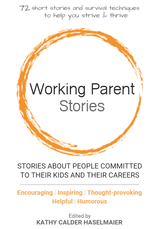|
Submitted by Kathy Haselmaier - "Employers need to find ways to neutralize and overcome the effects of How employers can improve employee retention among working parentsAs the editor of Working Parent Stories, you probably won’t be surprised to read that I’ve gotten to know a lot of working parents … and their stories. A common theme has emerged within many of the stories that is rarely discussed. We’re used to hearing about the need for better benefits and more flexibility within the workplace as a way of enticing more women to remain in the workforce, and most agree that these things are valued by all working parents and probably most employees. But something mentioned less often, and a theme that is emerging in many working parent stories, is that subtle messages are being sent to working mothers that can affect their determination to purse their careers and maintain the energy needed to succeed. The messages are sent by friends, relatives, and the media. They question a woman’s commitment to her family when she chooses to pursue a career. I call these messages “micro discouragements”. Every woman knows that if she has a child she will need to make “the choice”; will she return to work or exit the workforce after the baby arrives? Sometimes the choice is made with a partner. And sometimes there is no choice because returning to work is a necessity. Most men aren’t yet expected to make “the choice”. But as more and more women out-earn their partners, more and more men are finding they need to make “the choice” too. Recently I heard someone comment that working mothers often manage their careers like their fathers (who often had full-time "assistants" at home) while trying to mother like their stay-at-home moms. And some working fathers have few, if any, role models from dual-career couples. Some people dismiss these generalizations as outdated, but stories from young working parents suggest that the struggle is still very real for many of them. Even today. If you’re a man balancing fatherhood with a demanding career that requires hard work every day, every week, and every month, imagine the joy of a holiday gathering with family (which, of course, involves more and different work at home). And then imagine the feeling you’ll get when your father quietly asks you, “How’s work going? How sure are you that pursuing your career is really best? Isn't Kelsey's career going well enough to enable you to be home for the kids?” Could it feel a little like a punch in the gut? A “micro discouragement”? Could a steady stream of these messages start to undermine your enthusiasm, resolve, and energy? Many women who have careers are enduring these micro discouragements on a regular basis. Even today. They come from their parents, friends, aunts and uncles, the Internet, other parents, TV, cousins, magazines, people at church, and the radio. More and more men may start to endure them too. Some women let them roll off their backs and never give them a second thought. Some women are energized by them because they represent a challenge. But some women don’t find these comments energizing at all. These are the women who are at risk of dropping out of the workforce or have already. These are the women who struggle to maintain the energy needed to juggle multiple roles that include a career. These are the women who are often at risk of leaving your company or maybe the workforce entirely. These are the women who can’t fully enjoy the satisfaction of a job well done within the context of a career. So what can employers do? First, it’s probably worth noting that you can’t afford to provide enough benefits to impress “Aunt Susie” or “Tiffany” at the PTA meeting. No matter how much flexibility and assistance you offer your working parents, some of their friends and relatives are likely to continue delivering "micro discouragements", at least for the foreseeable future. So employers need to find ways to neutralize and overcome the effects of the “micro discouragements” with “micro encouragements”. They need to help working parents more clearly recognize the benefits their work provides to their families. The data is out there, and employers need to find ways to get it in front of their employees. They can also pair young working parents with older working parents who’ve mastered the balance. They can share stories of success within their own companies via web sites, videos, and newsletters. They can create forums so that working parents can encourage each other, discuss challenges, and share best practices. Find ways to provide “micro encouragements” to young working parents, and then reap the rewards for years to come.
0 Comments
Leave a Reply. |
The StoriesArchives
March 2022
Categories
All
|
Photos from barnimages.com, marcoverch, truewonder, donnierayjones, marcoverch, shixart1985, Gustavo Devito, edenpictures, nan palmero, quapan, The Pumpkin Theory, bark, opassande, Semtrio, Ivan Radic (CC BY 2.0), verchmarco (CC BY 2.0), Didriks, shawnzrossi, shixart1985 (CC BY 2.0), madprime, marksmorton, CT Arzneimittel GmbH, NwongPR, franchiseopportunitiesphotos, anotherlunch.com, jdlasica, wuestenigel, Frinthy, romanboed, Doris Tichelaar, quinn.anya, A_Peach, VisitLakeland, MEDION Pressestelle, Darren Wilkinson, bratislavskysamospravnykraj, Anthony Quintano, Danielle Scott, pockethifi, Bridgette Rehg, Martin Pettitt, PersonalCreations.com, wuestenigel, Thad Zajdowicz, archer10 (Dennis) 139M Views, Infomastern, beltz6, The National Guard, futurestreet, daveynin, OIST (Okinawa Institute of Science and Technology), Rinet IT, shixart1985, mikecogh, JeepersMedia, Ryan Polei | www.ryanpolei.com, Jake.Christopher., aleksandrajovovich, thepeachpeddler, wwward0, flossyflotsam, Got Credit, Senado Federal, Corvair Owner, lookcatalog, moodboardphotography, dejankrsmanovic, Carine fel, ElleFlorio, {Guerrilla Futures | Jason Tester}, greg westfall., Arlington County, mariaronnaluna, quinn.anya, wuestenigel, Tayloright, insatiablemunch, MrJamesBaker, Scorius, Alan Light, Monkey Mash Button, www.audio-luci-store.it, wohlford, Vivian Chen [陳培雯], okchomeseller, BoldContent, Ivan Radic, verchmarco, donnierayjones, Czar Hey, US Department of Education, Andrew Milligan Sumo, Michel Curi, anotherlunch.com, ProFlowers.com, Cultural viewpoints from around the world, alubavin, yourbestdigs, Rod Waddington, Tayloright, Wonder woman0731, yourbestdigs, donald judge, Thomas Leth-Olsen, Infinity Studio, shixart1985, wuestenigel, francesbean, Roger Blackwell, MrJamesBaker, Luca Nebuloni, MFer Photography, erinw519, boellstiftung, North Carolina National Guard, A m o r e Caterina, MrJamesBaker, bellaellaboutique, Free For Commercial Use (FFC), Prayitno / Thank you for (12 millions +) view, wuestenigel, Matt From London, MadFishDigital, Kompentenzzentrum Frau und Beruf, mikecogh, CreditDebitPro, marciadotcom, Mr.Sai, _steffen





 RSS Feed
RSS Feed